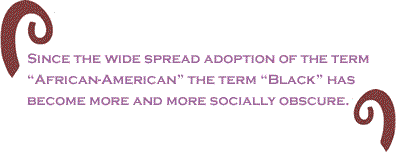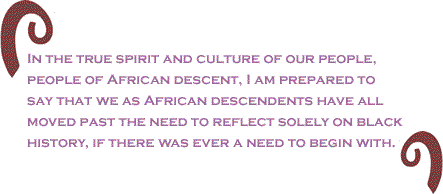As
another February drifts further and further away from the
memory of our people, as the reflections on Dr. King
and Malcolm X begin to fade away, as we move forward from
our moments of marvel at the journey up from the plantations
of slavery to the oval office of the White House, I for
one am declaring February 2011 the LAST BLACK HISTORY MONTH�EVER.
At
this point, you may be anticipating reading a piece by a
misguided Negro that has truly bought into the fantasy of
the post racial society or perhaps a nihilist more concerned
with the ability to predict a bleak future than to create
a better tomorrow. Neither is the case. In the
true spirit and culture of our people, people of African
descent, I am prepared to say that we as African descendents
have all moved past the need to reflect solely on black
history, if there was ever a need to begin with.
 The
idea of blackness has been in transition for people of African
descent for quite sometime. Since the wide spread
adoption of the term �African-American� the term �Black�
has become more and more socially obscure. Whereas
in the past, calling yourself �black� was a statement against
the idea of what it meant to be �colored� or �Negro�, many
of us have willingly shed the value of this socially created
identity for the more inclusive �African-American�.
This change of masks has allowed many of us to feel at one
with the imperial entity that is the United States, revel
in the electoral processes when they work in our favor,
and enjoy the same rose colored glasses framed with truth,
justice and the American way of our Caucasian, Latino, Native
American and Asian counterparts. This mask that we
wear now is particularly troubling when we consider what
it can actually means to be black. The
idea of blackness has been in transition for people of African
descent for quite sometime. Since the wide spread
adoption of the term �African-American� the term �Black�
has become more and more socially obscure. Whereas
in the past, calling yourself �black� was a statement against
the idea of what it meant to be �colored� or �Negro�, many
of us have willingly shed the value of this socially created
identity for the more inclusive �African-American�.
This change of masks has allowed many of us to feel at one
with the imperial entity that is the United States, revel
in the electoral processes when they work in our favor,
and enjoy the same rose colored glasses framed with truth,
justice and the American way of our Caucasian, Latino, Native
American and Asian counterparts. This mask that we
wear now is particularly troubling when we consider what
it can actually means to be black.
Molefi
Asante and others have provided an explanation more thorough
than I will attempt to here, but in paraphrase, they have
defined �blackness� as the natural oppositional force to
oppression in the known world, whether that oppression wears
the face of slavery, colonialism, imperialism and of course
the father of all these, racism. To be black then,
means to resist and to struggle not only against racism,
but also against the very philosophy of what white supremacy
is, every and anywhere. This is the reason why black
history has held such a valuable place in our hearts, at
its best, it is about much more than the date of the signing
of the voting rights act or the remembrance of the founding
of the National Urban League, it was a time to champion
all the brothers and sisters that stood up against the inimical
foe that is the racist state, and even though they may have
been defeated in their time, we still survive with some
victories and more work to do today. In short, black
history month used to be about the historical definition
of what it means to be black.

This
was before it became a corporate phenomenon, where companies
make black history month greeting cards with all the style
and none of the substance, where news networks spend 30
seconds talking about someone black and usually famous and
then spend the other 23 hours, 58 minutes and 30 seconds
painting most of the black people in the world in the worst
light possible, and where every story of black people, regardless
of where it starts, ends with the inauguration of Barack
Obama. To put it bluntly, blackness has been commodified
and our history has been condensed into the stuff bumper
stickers and t-shirts are made of.
This
is of course our fault for not being vigilant of our collective
identity. For not protecting the history of who we
are so that someone else couldn�t tell us who we should
be. A people firmly rooted in their identity know
that their ability to translate the truth of their history
is imperative to their ability to guide their people toward
ultimate perseverance and positive development. Considering
this, and upon further consideration, perhaps the reason
why black history has been so manipulated is because we
never really owned Black History Month to begin with.
Of
course, we all know about the creation of Black History
Month, by the brilliant Carter G. Woodson who called it
Negro History Week, but we never questioned why it should
be called Negro History Week then or why it is only Black
History Month now? Whether we call ourselves Negro
or Black we are, in conclusion, defining ourselves based
on the idea and reality of a society we do not control.
�Negro� is the name given to us and �Black� is the name
we took in rejection of it and yet, even to this day, we
have not collectively asked the question of what is our
name before any of this? We have not collectively
questioned whether or not Negro or Black were boxes big
enough to hold the consciousness of our people? We
have not considered whether or not Negro or Black were far
more limiting and divisive than another alternative?
In
the United States, people that may be considered �black�
may consider themselves Jamaican, Liberian, or Haitian.
If they don�t identify as �black� because of an allegiance
to their homeland, where does this place them in black history?
How do we begin to account for Africans that have families
who have never experienced Ku Klux Klan terrorism or Jim
Crow segregation? How do we account for Kittians that
have no relatives that were a part of the National Association
for the Advancement of Colored People or the Republic of
New Afrika? These are glimpses into the limits of
black history month. It doesn�t allow for the entirety
of the story of our people to be told. True, this
story takes lifetimes to tell, but currently the black history
story is one that has largely omitted the military strategy
of Hannibal, the indomitable will of Nzinga, the commitment
to liberation of Cabral, the critical assessment of Fanon
and the genius of Nkrumah.

By
becoming an African American phenomenon largely focused
on the 1960�s and 70�s (barely to the depth necessary),
Black History Month has prevented us from reconnecting with
a heritage and culture that pre-dates slavery and has left
the larger world of people of African descent at a loss
on how to participate. It has also let European society
off the hook for participating in a globalized effort to
exploit our people and resources. In this way, the
very application of Black History Month compartmentalizes
the legacy of our people and promotes the disconnection
that is the enemy of our unity. This is the reason
why Black History Month can be celebrated by our people
and racists and their organizations and institutions at
the same time. They are aware that in its current
construction and application it only tells us what they
want us to know and remember.
The
bad news is, we�ve allowed this to happen for far too many
years. The good news is, we don�t have to let it continue
and the alternative already exists. We are talking
about the official establishment African Heritage Month.
African Heritage Month is a time for all people of African
descent to share in our journey to this point. It
will be a time for us to not only remember the Harlem Renaissance,
but also the Songhai Empire, to not only pay homage to the
sacrifice of Malcolm X, but also that of Patrice Lumumba.
To not only hear the liberation themes of Bob Marley but
also those of Fela Kuti. Of course, African Heritage
Month won�t receive the publicity of Black History Month.
There won�t be any fast food commercials or cable news network
specials. We should be happy about this. The
society at large has always worked to keep us generally
disunited and totally un-African. By now, we should
expect this. But at the end of the day, if we are
truly to put our right to Kujichagulia into place,
we must define ourselves and our reflection times for ourselves.
This is a crucial step toward becoming what it means to
be African.
So
that�s why there won�t be any more Black History Months
for me. I encourage you to join me in celebrating
African Heritage Month from now on. After all, it
can�t be done without you anyway.

BlackCommentator.com
Guest Commentator Charles J. Evans is a modern day culture
critic, philosopher and warrior scholar. Click here
to contact Mr. Evans.
|

